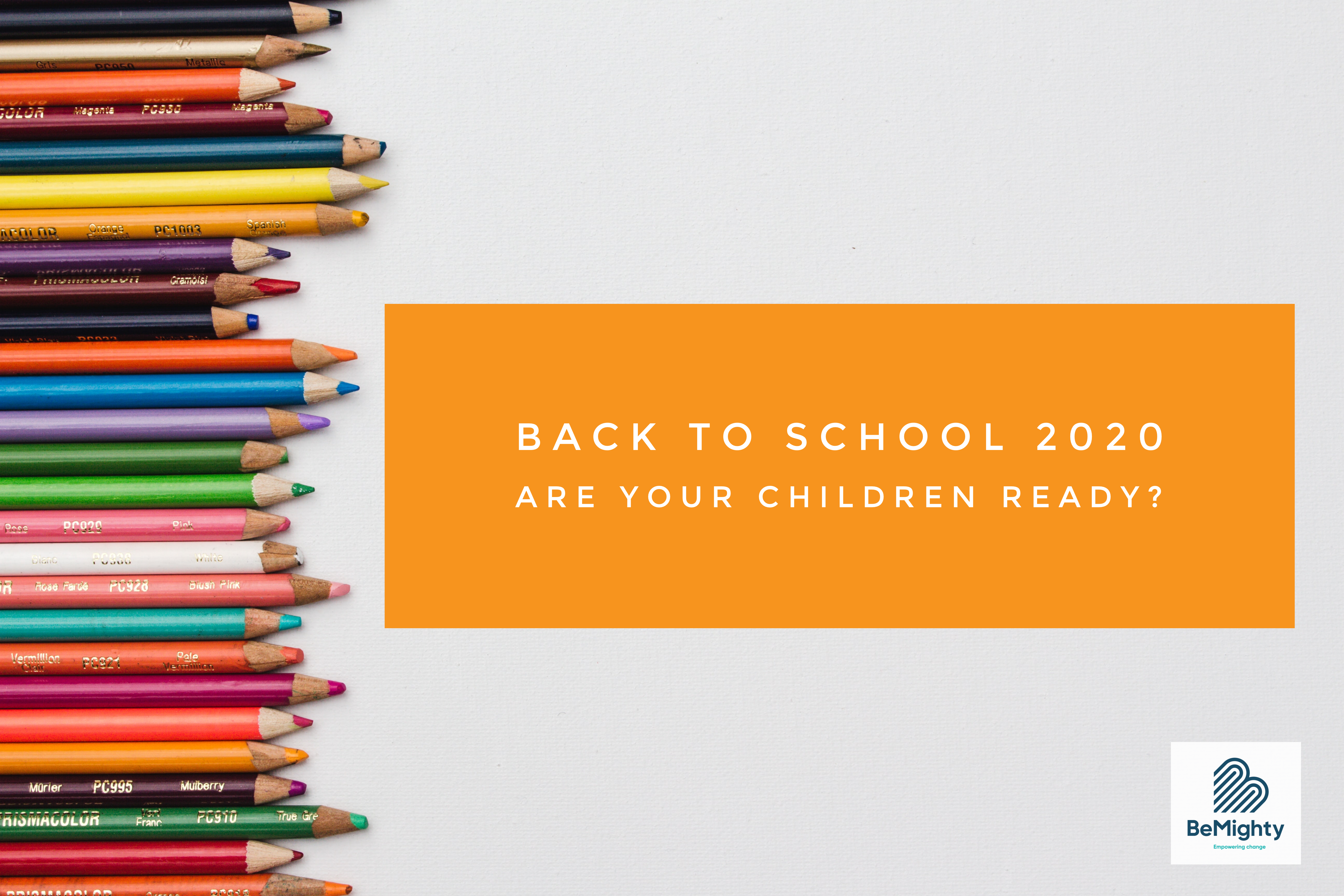In England, schools go back in a few weeks. Having just done the annual big uniform shop and spent a small fortune on the little people in my world, I know that I have at least ticked this job off the list. As to preparing them mentally for September and the new normal, I’m not so sure.
Children are resilient, we know this, from the way they can tie us adults in knots whilst they are in despair from a fallout with a friend and in the next minute are totally engaged in fighting with their siblings or creating a new lego super tower. They are fine and you are left reeling, gasping for emotional air to support you, or a large glass of wine!

I’m working gently with our children, at dinner time, as we all sit round the table and chat about the day, I might gently bring in the topic of school and what they are looking forward to most? Watching for any hesitation, that later, in a quieter moment, I might pick up on . Our 6 year old is yo-yoing from wanting to stay at home and be homeschooled to desperately wanting to play with his friends and I’m pretty sure this is common for this age group. Our middle child starts secondary school this year, along with thousands of others across the country. Many of which have not had the transition period we might have liked to provide them with, so that they feel a bit more confident about this leap! As for our 13 year old, we are fortunate that she takes things in her stride, right now at least, and can’t wait to socially reconnect with her friends.
What we can do as parents to help them be ready?
- Test the water. Bring in the concept of school indirectly at first. Do this when they are in a high resource state, this means when they are not worrying about anything else and they are buoyant and energetic! You might ask questions such as those below, which invite your child to consider the question which falls under the general umbrella of “school” without directly asking them; “Are you worried about going back to school?”
Do you think all your friends have sorted their uniforms yet?
I wonder if any of your friends have got new school bags like you?
Who do you think will be the tallest out of your friends now?
What topics might you cover with Mrs X this year?
- Watch how your child behaves. When you’ve done this a few times and there is hesitation or a shift in emotional state then this can be a sign that there are some worries going on and your child may benefit from some support to untangle their concerns and build their confidence in their ability to cope. Perhaps you watch them start thinking about the question and then disengage from the conversation, caught in their thoughts, or you might see a drop in their shoulders, a lack of eye contact and a complete avoidance of the question.
- Talk to them 1 to 1. If this is the case, then ideally, find some together time with your child, going for a walk, being in nature, or in the garden, can help just because there are other things to look at and focus on, and you avoid the interview type question and answer session! Creating space for your child to chat, ramble, talk without you asking questions, where you are just there with them is a powerful way to let them feel heard. The conversation might start with dinosaurs, the latest Bondi Beach rescue episode (maybe this is just our household!) and what we’re having for dinner but with space will naturally evolve into what is really going on for them.
- Share your experience. Sometimes your child might find it hard to verbalise what they are feeling, by sharing your own experience of your first day of school, the emotions you were feeling and the fears, the things that happened, how quickly it all became normal. How you survived! All of this helps them get a bigger perspective on the problem, reminds them that all of us have been through this, even if it was a long time ago!
- Covid 19. If there are specific concerns about the new changes because of Covid19, you might share any fears you had of returning to work and how these fears have reduced now that you know what happens. Fear works in the arena of the unknown and it’s a huge arena, one that can grow very fast! If you can share how you dealt with your fear, perhaps acknowledging that you realised that you had to stop feeding your fear with “what if” questions which only make the arena bigger, and you decided to focus on what you did know and what you would do to cope, all of which helps make the arena smaller again! Invite your child to tell you all the questions they are asking themselves or what they are imagining, you might even write them down, you can then help them answer them, explore them and also teach them that sometimes there are no answers so we have to trust that we will be ok!
- Special Note: If you are scared for your children going back to school, but you have decided they are going to go back, the likelihood is your child will pick up on this too, if possible avoid sharing your fears about this with your child, talk to another adult about this, your child is not equipped emotionally or cognitively to deal with your “baggage of fears” and as their parent, they will model your behaviours because you are their carer. I too have fears about this unknown and 2nd waves etc. I also know that the rates locally are very low and the schools have made amazing thorough changes that will no doubt evolve as the situation does. If we decide at any point that it is not safe for my children to be at school, perhaps as local cases rise or if we consider that the school is not taking the appropriate action, then we will review our decision at this point. All of this information, though, is for me and my husband to discuss, what we communicate to our children is our faith in a) their ability to follow the guidelines and b) the safety measures put in place by the school. Our children are empowered with the knowledge that if they don’t feel safe we want to know so that we can explore this as a team, make educated decisions based on information not fear.
- Build their self trust and resilience. As parents, one of the greatest gifts we can bestow on our children is that they can cope. That whatever happens they will figure it out and we are there to help them. That even though they might get lost in the new secondary school building, might not know what to say when they meet new people, playtime won’t be the same, or someone in their class might test positive for Covid19, reassuring them that “yes” this could happen serves them better than pretending it won’t, especially when you also remind them they have all the skills and support necessary to cope if it does. That they will find their classroom by asking for help, that eventually they will think of something to say, even if it is odd and people might laugh, that playtime will be different but that doesn’t mean it’s bad, that if someone in their class does test positive for Covid19 then we will spend some more time at home together. When we support our children to trust in themselves and in their own ability, we equip them with confidence for life! We never know the outcome! We predict it, sometimes very accurately and other times not. There will always, always, always be stuff that is unknown, that we don’t know how to handle, that we haven’t done before, that we feel unsure about, but this doesn’t mean we can’t get through it, or should avoid it. It just means that there will be a temporary feeling of uncomfortable and this is ok and perfectly normal. Without teaching our children this, they grow up thinking that they should never feel worried, uncomfortable, sad or angry. All of these are normal emotions for humans, the problems exacerbate when we tell our children not to feel this way and they start to hide their feelings, deep down…. eventually they will leak out!
- Getting Comfortable with Uncomfortable! This 15 minute video talks in more depth about getting comfortable with uncomfortable and may be a useful tool to share with older children. https://youtu.be/PrGx432BHbc
For more information about Miriam visit http://www.bemighty.coach


